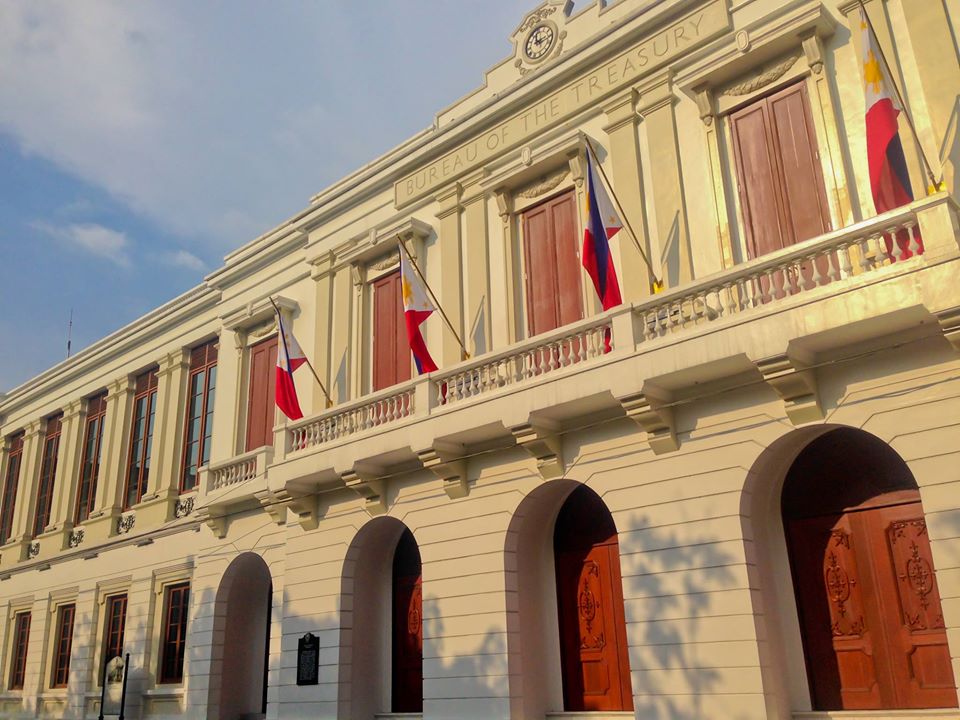
The Ayuntamiento de Manila which houses the Bureau of the Treasury (From the Facebook account of the bureau)
MANILA, Philippines—The Bureau of the Treasury (BTr) on Tuesday (March 15) raised P13.04 billion from reissued four-year bonds, while local governments continued to borrow more for their infrastructure projects, the latest Department of Finance (DOF) data showed.
The BTr’s auction was slightly oversubscribed with P35.31-billion worth of tenders for the P35-billion offering of IOUs maturing in four years and 23 days’ time. However, the BTr capped the bids it accepted, which were awarded at an average annual rate of 4.669 percent. Bid rates hit a high of 4.8 percent and a low of 4.5 percent.
“Rates continue to rise as the market remains defensive and watchful for the FOMC decision on rate hike,” National Treasurer Rosalia de Leon said, referring to Federal Open Market Committee of the US Federal Reserve, which was expected to increase interest rates by at least 25 basis points (bps) during its meeting this week.
Also, De Leon said “lingering concerns on higher inflation,” due to spillover effects on global oil and commodity prices by the Ukraine-Russia war, pushed bid rates up.
Last Monday, Bangko Sentral ng Pilipinas (BSP) Governor Benjamin Diokno said that if global oil prices averaged $95 per barrel this year, inflation would likely hit 4 percent or the top end of the 2 to 4 percent target band, higher than the current 3.7-percent forecast. If oil costs jumped to $120 and $140 a barrel, headline inflation would climb to 4.4 percent and 4.7 percent, Diokno had said.
To date, the BTr borrowed a total of P260.1 billion through the bond series maturing in April 2026. Tuesday’s auction was the second consecutive domestic fund-raising where the BTr partially awarded the securities it offered, unlike the previous two weeks where it shut out borrowings due to high yields sought by domestic creditors.
Separately, the latest data of the DOF’s Bureau of Local Government Finance (DOF-BLGF) also on Tuesday showed that local government units (LGUs) borrowed a total of P5.7 billion from January to February this year, as reflected in the certificates of net debt service ceiling and borrowing capacity (CNDSCBCs) they submitted to the BLGF.
CNDSCBCs are documents that LGUs need to submit to government financial institutions (GFIs) in order to prove that they can repay their borrowings. As of end-February, the BLGF issued 44 CNDSCBCs to a similar number of LGUs — one province, 10 cities, as well as 33 municipalities — which sought loans from GFIs to finance their local programs and projects during the first two months of 2022.
The 44 CNDSCBCs as of February showed a total borrowing capacity amounting to P18.3 billion, which meant that the borrower-LGUs have the capacity to settle their obligations.
In February alone, the BLGF issued 22 CNDSCBCs worth P3.5 billion to 22 LGUs — one province, six cities and 15 municipalities — which had a combined borrowing capacity of P13.7 billion.
LGUs’ borrowings in February were mostly intended for the procurement of heavy equipment. as well as construction of public markets, hospitals, roads, solid waste facilities, sanitary landfills, cemeteries, and housing projects, among other local infrastructure, BLGF data showed.
Last year, LGU borrowings hit a record P96.7 billion, as a flurry of local projects were started and fast-tracked a year before the elections in May and despite LGUs’ larger share in the national budget from all tax collections alongside their devolved functions and bigger responsibilities.

